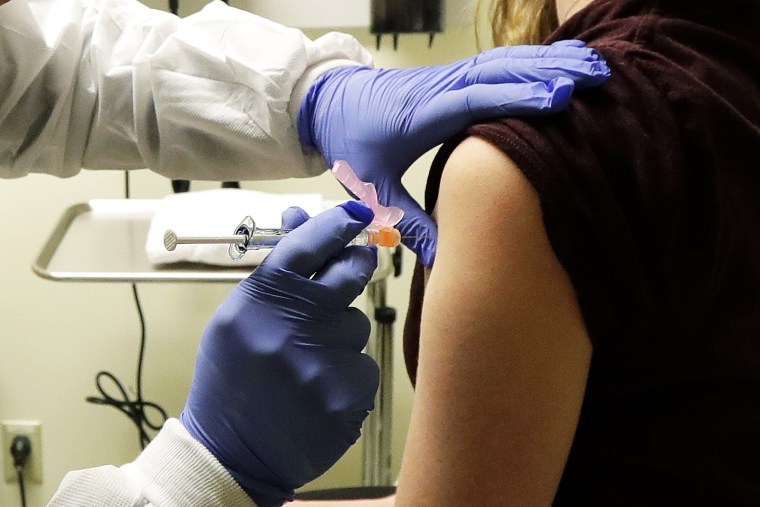Finding a vaccine for coronavirus has become a public health priority, and pharmaceutical companies and researchers across the country are hard at work on different contenders.
The process of creating a viable vaccine, however, is long and arduous, even before its manufacturer seeks regulatory approval from the Food and Drug Administration, which is required before the vaccine can be deployed to the general population.
After development of the vaccine and preclinical testing, there are three phases of human testing before it is submitted to the FDA for approval. Dr. Anthony Fauci, director of the National Institute of Allergy and Infectious Disease, said the earliest a coronavirus vaccine would be deployable would be a year to a year and a half from now.
While many companies are working on vaccines, below are two potential vaccines and one "passive vaccine" that experts tell NBC News are closest to being tested, approved and available to the U.S. public.
Full coverage of the coronavirus outbreak
Moderna's mRNA-1273
Moderna Inc. of Cambridge, Massachusetts, has already begun Phase I human testing of its mRNA-1273 at Kaiser Permanente Washington Health Research Institute in Seattle. The test has enrolled 45 healthy adults ages 18 to 55. Phase I will continue over the next six weeks.
The vaccine was developed using part of the genetic sequence from COVID-19 called mRNA, or messenger RNA. Traditional vaccines use the virus itself; Moderna's mRNA-1273 works off a sequence of the virus' genetic code, instead. The vaccine is designed to direct the body's cells to produce an antibody — a virus-fighting protein — and spur a robust immune response. It has already shown promise in tests on animals.
Phase I of testing looks at the vaccine's safety and whether it is producing an immune response. A later phase of research will look at whether the vaccine is effective in preventing infection.
Subjects get an injection on days 1 and 29 and will be followed for 12 months after the second injection.
Regeneron's REGN3048-3051
Regeneron Pharmaceuticals of Tarrytown, New York, is working on an antibody treatment that uses the virus itself. The company genetically modifies mice to have human immune systems and then exposes them to part of the virus. The mice then build up antibodies to fight the virus.
Scientists have isolated the antibodies, as well as antibodies from humans who have recovered from COVID-19, and they will select the top two antibodies to create a cocktail that is injected in the patient. The two antibodies will target different parts of the virus and may help protect against multiple viral variants. In theory, that means the drug could still be effective if the virus mutates.
All coronaviruses have a protein called a spike protein on the surface of the virus cell, which bonds the virus to the host cell. This drug aims to target the spike protein to block it from interacting with the host cell and thus neutralize the virus.
Regeneron's drug could be used as a treatment for those who are already infected, but according to the company it could also be used as a preventive measure for the healthy, like a vaccine. Such drugs are sometimes referred to as "passive" vaccines.
Regeneron used the technology to develop a drug for the Ebola virus, which is under review by the FDA.
The company hopes to have doses of its coronavirus drug available for human testing by the beginning of the summer.
Inovio's INO-4800
Inovio Pharmaceuticals of Plymouth Meeting, Pennsylvania, is using an approach similar to Moderna's to develop a vaccine by modeling off the virus' sequence. Three hours after China published the sequence of the virus online, Inovio developed INO-4800.
Inovio uses something called DNA medicine, which is made up of optimized DNA plasmids. These are small circles of double-stranded DNA that are reorganized by a computer-sequencing technology and designed to produce a specific immune response in the body. Inovio delivers the optimized plasmids directly into the cells, where they begin replicating and strengthening the body's natural response mechanisms.
Download the NBC News app for full coverage and alerts about the coronavirus outbreak
Inovio has already developed a vaccine using this method for MERS, a different type of coronavirus. It is in Phase II of testing.
The company has begun preclinical testing of its COVID-19 vaccine in animals that have shown the desired immune response. It hopes to begin human trials in April starting with introduction in 30 healthy people.

